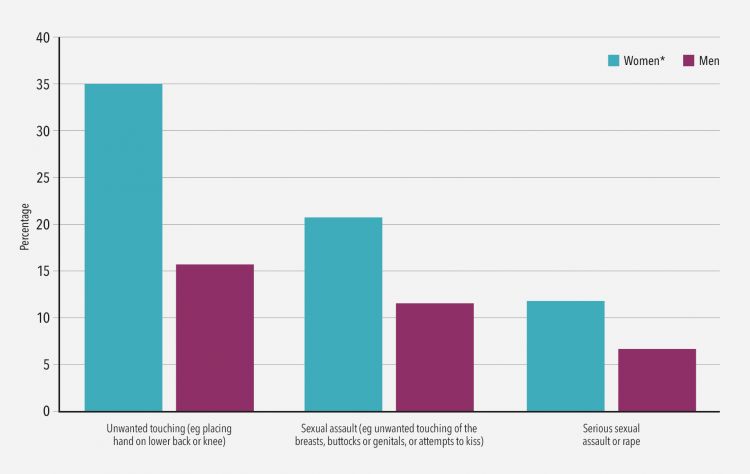
Lifting the lid on the hidden epidemic of LGBT sexual harassment at work
- A TUC study into LGBT sexual harassment at work in the UK found that nearly 7 in 10 (68%) lesbian, gay, bisexual and trans (LGBT) people have been sexually harassed at work.
- Two-thirds (66%) did not tell their employer about the harassment, and a quarter of those said they didn’t report because they were afraid of being ‘outed’ at work.
- The TUC is calling on the government to change the law to make employers directly responsible for preventing harassment.
For years, sexual harassment at work was swept under the carpet. But when the #MeToo movement exploded in late 2017, it finally exposed the ugly reality of too many working lives.
Over the past 18 months, thousands of people across all sectors have shared their experiences of sexual harassment and sexual assault at work.
Yet the voices of LGBT people have rarely been heard. We wanted to change that because we believe their stories need to be told – and it’s our mission to make the workplace a better place for everyone.
So today, on International Day Against Homophobia, Transphobia and Biphobia, we’re publishing the first major report into LGBT sexual harassment at work in Great Britain.
It makes for shocking reading for anyone who cares about stamping out sexual harassment and assault at work in all its forms.
What's in the report?
Our research reveals that seven in 10 LGBT people have experienced sexual harassment at work.
And that LGBT women, BME people and disabled people are the worst affected by this hidden epidemic.
The message is clear: workplace cultures need to change urgently.
That’s why we’re calling for the government to change the law so that employers, not victims, are responsible for stopping harassment at work.
Because we believe LGBT people have the same right to feel safe and supported at work as anyone else.
A hidden epidemic
Until now very little has been known about the true extent of sexual harassment of LGBT people in the workplace.
That all changes today. Our report, which is based on a survey of over 1,000 LGBT people who have worked within the last 5 years, reveals the massive impact that sexual harassment has had on their lives.
Take Helen (not her real name), who describes herself as pansexual and is in a long-term same sex relationship.
Helen regularly experiences verbal sexual harassment at work. She told us about one recent occasion when she was at the office gym:
The impact of dealing with experiences like these can’t be understated.
Around 1 in 6 of those we surveyed said the harassment they received had affected their mental health, and a similar number left their job as a result.
Worryingly, 1 in 25 described the experience as so unbearable that it caused them to leave their job without another job to go to.
Women worst affected
Our report uncovers the shocking levels of unwanted touching and sexual assault that LGBT workers, particularly women, face.
The following chart shows that a staggering 35 per cent of LGBT women and 16 per cent of men had experienced unwanted touching at work:

Over a fifth of LGBT women and one in eight (12 per cent) of men had been sexually assaulted.
Worse still, 12 per cent of women and seven per cent of men reported being seriously sexually assaulted or raped at work.
Touching my breasts on a work night out... trying to kiss me... it was related to turning me straight and trying to show me what I am missing.
The full report breaks down these figures by sexual orientation, gender and gender identity. It shows that trans women and BME LGBT women are even more likely than others to have experienced this at work.
Similarly, gay bisexual and trans BME men are much more likely than white men to have been sent pornographic material or faced unwelcome verbal sexual advances.
And disabled LGBT people – men and women alike – also reported much higher levels of sexual harassment than non-disabled people.
Suffering in silence
Two thirds of those who had been sexually harassed or assaulted at work didn’t report it to their boss.
When asked why, over half told us they worried it would have a negative impact on their relationships at work.
We were particularly concerned to learn that a quarter of respondents said they didn’t report being sexually harassed because it would have revealed their sexual orientation and/or gender identity.
What do we want to change?
Our report highlights the shocking extent of LGBT sexual harassment at work.
And it shows that the barriers for reporting this unacceptable behaviour are much too high.
That’s why we want the government to change the law to make employers directly responsible for preventing harassment.
We also need a statutory code of practice on sexual harassment and harassment at work and stronger legislation to tackle third-party harassment.
Employers can’t be let off the hook either. They must take urgent action to make
all work policies inclusive, review existing policies and adopt a zero-tolerance approach to all forms of discrimination and harassment.
Unions also have a key role to play, so we’re calling on them to review their guidance, training and employer policies on sexual harassment.
Above all we want government, employers and unions to put this issue front and centre of their workplace campaigns and policies.
Because we can’t allow this behaviour to go unchecked any longer.
So today should mark the beginning of the end for those who think they can sexually harass or assault LGBT people at work.
Because a year and a half after #MeToo, their time’s up too.
Stay Updated
Want to hear about our latest news and blogs?
Sign up now to get it straight to your inbox

